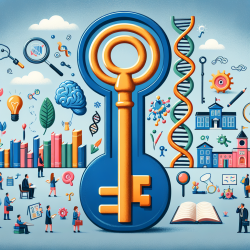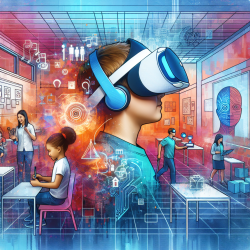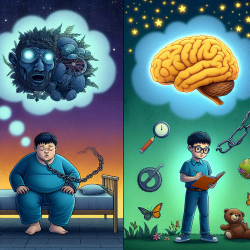Introduction
As a Special Education Director, understanding the complexities of reading disabilities is crucial to fostering an inclusive educational environment. The research article "The Genetics of Reading Disabilities: From Phenotypes to Candidate Genes" offers profound insights into the genetic underpinnings of reading disabilities, particularly dyslexia. This blog aims to guide practitioners in implementing these findings to enhance their skills and encourage further research.
The Genetic Landscape of Reading Disabilities
Reading disabilities, including dyslexia, are neurobehavioral disorders affecting 5-10% of school-aged children. These disabilities are not only complex but also genetically heterogeneous, meaning multiple genetic factors contribute to their manifestation. The research highlights several candidate genes and loci associated with dyslexia, such as DYX1C1, DCDC2, and KIAA0319, emphasizing the genetic basis of these conditions.
Implementing Research Findings in Practice
To improve educational outcomes for students with reading disabilities, practitioners can integrate the following strategies based on genetic research:
- Individualized Education Plans (IEPs): Incorporate genetic insights into IEPs to tailor interventions that address specific cognitive and phonological deficits.
- Early Screening and Intervention: Utilize genetic markers to identify at-risk students early, allowing for timely interventions that can mitigate the impact of reading disabilities.
- Collaborative Approaches: Foster collaboration between educators, geneticists, and neuroscientists to develop comprehensive support strategies that consider both genetic and environmental factors.
Encouraging Further Research
The genetic complexity of reading disabilities necessitates ongoing research to unravel the intricate relationships between genes and observable traits. Practitioners are encouraged to:
- Engage in Cross-Disciplinary Research: Collaborate with researchers across fields to explore the interplay between genetics, brain function, and educational outcomes.
- Participate in Longitudinal Studies: Contribute to studies that track the development of reading skills over time, providing valuable data on the efficacy of genetic-informed interventions.
- Advocate for Funding: Support initiatives that fund genetic research in education, highlighting the potential for personalized learning approaches.
Conclusion
The research on the genetics of reading disabilities offers a promising avenue for enhancing educational practices. By embracing these insights, practitioners can better support students with reading challenges, paving the way for more effective and personalized educational experiences. To delve deeper into the genetic aspects of reading disabilities, I encourage you to read the original research paper, The Genetics of Reading Disabilities: From Phenotypes to Candidate Genes.










